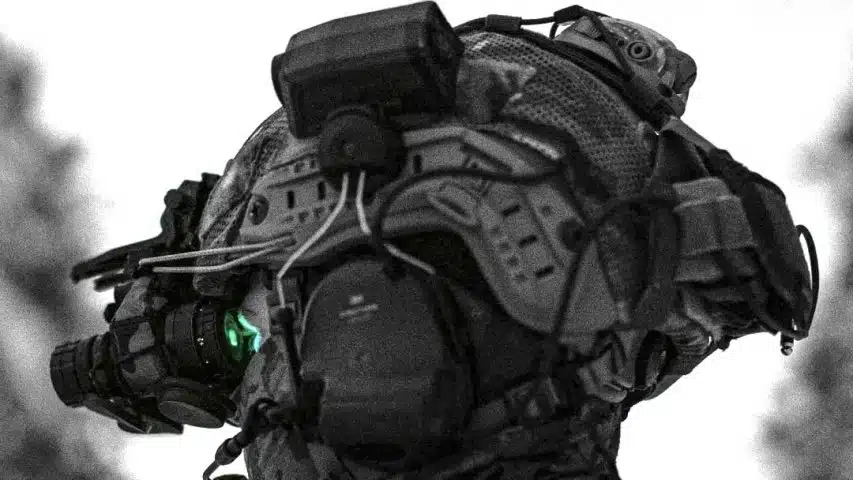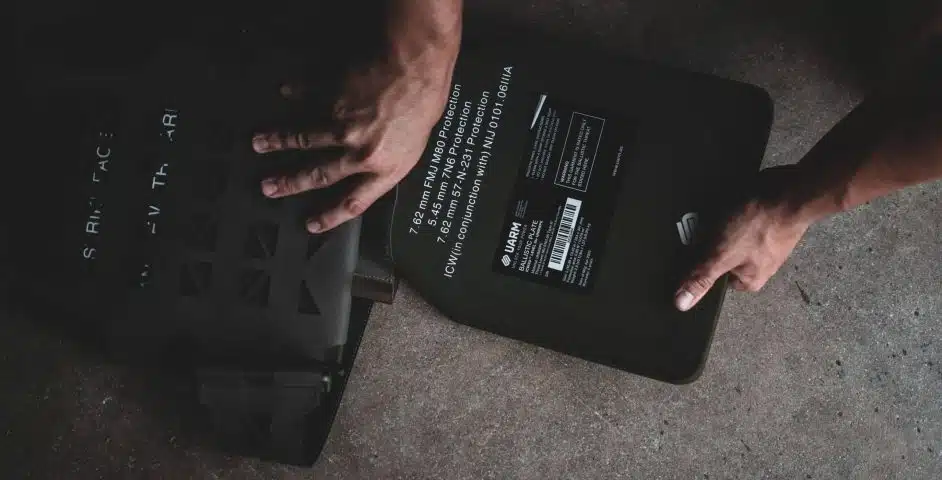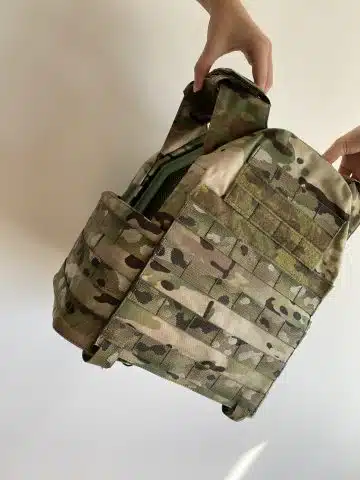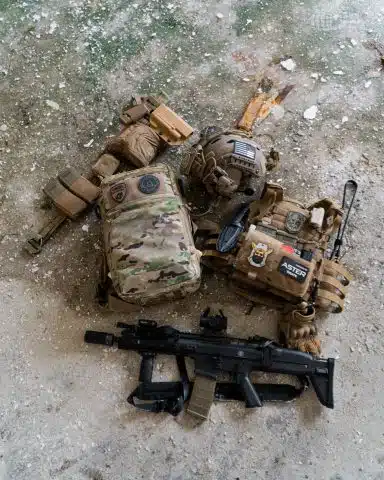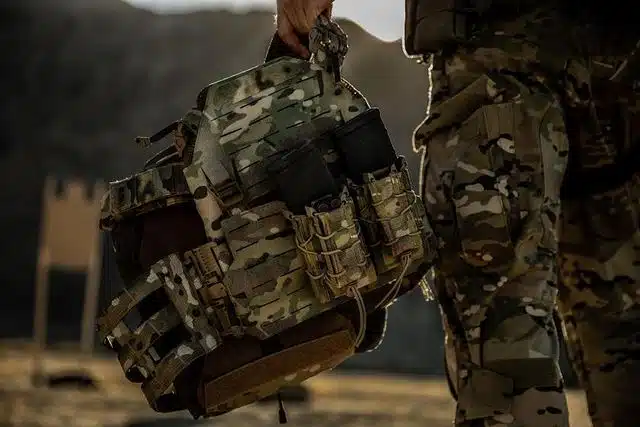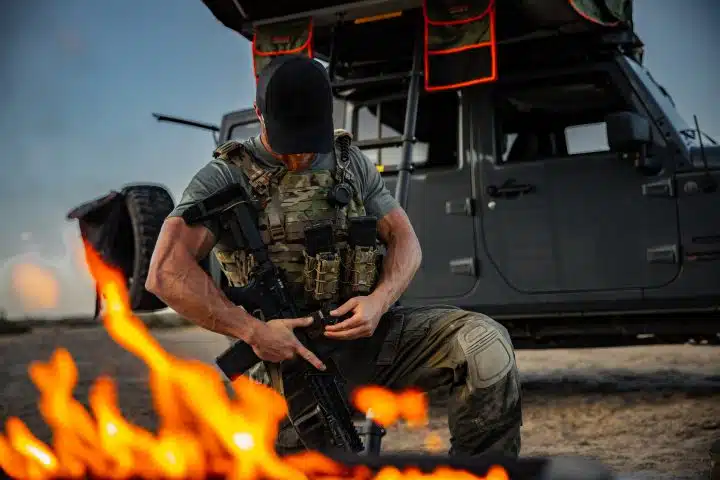Even though some states are debating if it should stay this way, it is legal for all law-abiding citizens to own and wear body armor. Most body armor laws by state are simply a recognition of 18 U.S.C. 931 with no additional restrictions.
But, as always, things are not as straightforward as they seem at first glance. Not all types of body armor are allowed even for owning, and there are situations and locations where you can’t wear your armor openly.
Cases where you can’t wear body armor:
- Convicts of violent crimes under 18 U.S.C. § 18
- Those committing a violent crime
- Online shoppers in Connecticut
- Attending school students in Louisiana
With a few strange exceptions, body armor laws in the United States are very reasonable. If you are a good citizen and a patriot you can and should own and wear a bulletproof vest. But, if you are a convict or want to LARP being a military member, you may be penalized.

For professional security contractors, as well as police officers and first responders, it is best to consult with your employer’s legal department on which type of body armor you can and should use, including that you use in your free time. Even when it is not against the law, some companies have a code of conduct that applies if you are an employee.
Finally, always consider your specific situation even aside from legal boundaries that might apply. Be sure to have good communication with your neighbors and your community, and attempt to reassure anyone that might not be comfortable with openly wearing arms and armor. In the end, body armor is there for protection, not for causing conflict.
The Constitution and Federal Law
The Code of Laws of the United States of America is quite direct when it comes to wearing body armor. It is not legal only for people convicted of violent crimes, and even they can wear one if given written permission by their employer.
This affirmative defense stated in 18 U.S.C. § 931 allows for those who have served their time to still perform jobs that require body armor. This opens work opportunities and their further reacceptance to society. But, it prevents those who plan to return to the life of crime to be protected with body armor.
Additionally, US Code only prevents those who are convicted of violent crimes to wear armor. This doesn’t include missing a comma on your tax report, or a parking violation to leave you unprotected in your workplace or just going about.
Violent crimes are those that had the use or threat of physical force involved. Anything below that isn’t included in the code. But, some felony charges may be applicable in this situation. Owning narcotics with an intention to sell is one example where something that might not have involved any violence would be used as a felony charge to revoke your right to wear body armor.
Felony and Misdemeanor
Both Federal and State law have clear disambiguation between felony and misdemeanor charges. Those convicted have vastly different access to certain civil rights and freedoms, even upon release. Under Federal law, owning body armor as a felon will add another felony to your record.
Due to the three-strikes rule, if this can be added as an additional charge, any convicted felon might be facing an extended sentence, including life in prison.
Due to these circumstances, those who have done their time and wish to work in security services need to have all of their papers and employer instructions at hand. Any infraction can vastly increase a sentence or lead to legal fees that might do an even worse number on your livelihood.
Certain states will allow for felony owners of body armor to be charged with a misdemeanor that only comes with a fine. In these cases, the three-strikes rule will not apply. Still, the costs of not having express permission to have body armor on you can severely impact your life.
For veterans that had a hard time after returning from overseas, these small charges may add up. Always contact your local VA for assistance and legal counsel. Additionally, you may ask about your rights and any restrictions that apply ahead of time, if you want to be sure that you are in the clear.
Specific State Laws
While some states might impose some additional paperwork for owning certain types of body armor, most only refer to federal law when it comes to this issue. In many states, it is not only legal but welcomed for law-abiding civilians to own body armor, as it is proven to have significant benefits on the number of homicides.

But, there are three exceptions, as you may have noticed in the list.
In the State of Louisiana, it is illegal to wear body armor on school grounds. The idea behind this weird law is that school shooters can be stopped before they enter the premises only by the fact that they are wearing a bulletproof vest.
Sadly, as we have seen in the unfortunate events of April 14th, 2003, this law doesn’t have the desired effect. Deranged perpetrators wounded three and murdered one in a New Orleans high school.
Pushed by the events in Sandy Hook, Connecticut had a series of laws imposing restrictions on how citizens can purchase arms and armor. While it is completely legal, and widely accepted, to buy and wear body armor, it needs to be done in person. The belief is that it would be harder for would-be criminals to buy equipment from an experienced salesman who might even report them to the police.
Kansas Parade Ban
In the great state of Kansas, it is illegal to carry, wear, or possess any type of bulletproof vest if you are a part of a large gathering. This includes parades, rallies, demonstrations, and any similar event.
There is no other restriction in this state, and there isn’t even an added felony charge if you are committing a crime with a vest. But, you can’t parade with your vest on.
Strangely enough, this restriction doesn’t apply to firearms. The probable idea behind the law is to prevent shooters and give an upper hand to the police. While this might sound weird for a gun rally, in those cases there would probably be much more good guys with a gun than there could ever be bad ones.
With this legislation, Kansas stands out as the only state with public restrictions on wearing body armor. It seems that for Kansans, there truly is no place like home.
Additional Felony Charge
Finally, multiple US States forbid the use of body armor while committing a crime. This would be used as a separate offense from the act itself and added as a penalty to the sentence.
There States are:
- Arizona
- Delaware
- Florida
- Indiana
- Massachusetts
- New Hampshire
- New York
- North Carolina
- Oklahoma
- South Carolina
- Tennessee
- Virginia
- West Virginia
Thankfully, there is an easy solution for this law not to affect you. Simply don’t commit any crimes whatsoever. Try to protect those who might be victims of crimes, keeping this nation safe and free.
Protective Armor
While body armor doesn’t have the same level of constitutional protection as firearms, it also doesn’t need it. Currently, only the State of New York is even debating any restrictions for wearing bulletproof vests, and it doesn’t seem as even that will pass.
Both soft armor and hard plates are seen as strictly protective and there are few communities that frown on the idea of wearing them anywhere.
But, there is one serious issue when it comes to any type of military gear that every buyer should know. It is strictly illegal to buy, sell, or own any stolen military equipment or transfer equipment without a EUC to another person without permission.
When it comes to body armor, especially NIJ Level III and Level IV, there is a lot of shady online offers that might have come from neglected storages or via corruption. These armors are not only illegal to have, but are often discarded for a reason. They might be deficient, defective, or have some other issues that you are not familiar with.
Obtaining a EUC
If you are buying any type of armor from a military surplus store, you may receive a EUC, which stands for an End-User Certificate. This document forbids you from selling the bulletproof vest further or giving it to someone else.
This arrangement is made to prevent the flow of certain goods, often military and security gear, from being sold to potentially hostile groups or nations. While it is generally a weak preventative measure when it comes to unauthorized selling, it may be a problem for the buyer.
If you are found in possession of a piece that is under EUC by another person, you might be charged with theft and trafficking at the low point, and for terrorism under the Patriot Act. You don’t want to spend a paid vacation in Guantanamo because of a hasty purchase.
The only solution is either to buy from legitimate stores directly and be the holder of the EUC or buy from a private retailer or manufacturer. When it comes to body armor, the latter often has as good or better models that the military itself.
Hold to Your Receipts
Even if you are buying from a certified retailer, you will want to save your receipts. For online purchases, it will be enough just to archive the email you got when you bought your gear.
As some types of armor may look very similar to the ones owned by the US armed forces, you will want to have proof that you have bought your gear legitimately. As this can easily fit in your smartphone, it is a good thing to have on hand when needed.
As this is a general rule for shopping, prudent buyers just need to do the same as they always do. But, if you don’t have the routine of holding to your receipts you just need to remember not to delete the email confirming your purchase. While there are other ways of proving the legitimacy of your gear, this is by far the easiest one.
If you don’t own any type of document, you can be held up to 24 hours until the seller is contacted and confirms the purchase from their side. Otherwise, it can take days for the plates to be confirmed by the authorities as a private purchase by its serial number.
Military Gear
There is a whole set of laws that don’t apply to body armor directly but may be used on people who wear body armor. These cases are most prevalent with people who like to wear military surplus attire in general and can create unnecessary issues without the person knowing.

Additionally, there are cases where you might place symbols or additions that might be misunderstood by local authorities or groups. When selecting your armor and carrier, especially if you wish to add your personal touch afterward, be mindful of how are you perceived.
Hate Symbols and Public Perception
Under the 1st amendment it is not illegal to wear any symbol on your person and you can’t be detained unless you are directly causing distress. This includes writing ‘this is a robbery’ on your carrier when you go shopping.
But, there are personal situations that might be perceived as dangerous, especially if you are wearing external body armor. These include any symbols, numbers or signs that may be seen as hate symbols or political extremists.
This will not place you in a legal bind from the government, but there are private businesses that might refuse your business. Also, it is a positive defense for the other side if you enter any type of conflict.
To put it plainly, the same way you wouldn’t appreciate someone having an ISIS flag on their armor some places have different relations with some other symbol.
Impersonating an Officer
It is always inappropriate to wear any type of military insignia that you haven’t earned. There are people who have died and bled for our freedom, and it is deeply offensive to use their sacrifice as a fashion statement.
And if you pretend that you have earned it, it is also illegal.
By the Stolen Valor Act of 2013, it is against the law to impersonate a military officer or a veteran for material gain. This includes housing and benefits, but also discounts.
If you have inherited your insignia from your parents or ancestors, make sure to wear them on the right chest side of your uniform or armor. Celebrating your forefathers is a great thing, but you do them no honor by stealing their valor.
Special Circumstances
There is a set of special circumstances where you can wear body armor even if fall out of the US Code regulations. Additionally, a certain set of emergency acts can see your gear confiscated or commissioned.
And, for some jobs, there will be company regulations on how your bulletproof vest should look, as well as the type of vest you can use.
First of all, if you are a convicted felon, you can still wear a vest for your job, and only for your job. Ideally, this armor should be the property of your employers and you should carry a note from the said employer that you need this type of protection.
Also, if you are a member of any emergency groups, such as a first responder or a paramedic, you want to have your signs on your armor clearly stated. This also means that if you have a patch that says ‘Paramedic’ or ‘Red Cross’ and you are not a member of these groups you may be imprisoned for impersonating.
Finally, if there is an emergency and you are not a member of any official group, make sure to apply at your community center or branch of local government first. This may be done in person or via a telephone. In some circumstances, you may be charged with interference or have your gear confiscated if you don’t cooperate with the officials.
Buying and Selling Online
Apart from the State of Connecticut where both buying and selling body armor online is forbidden, you can legally purchase bulletproof vests in all other states from online shops, or via telephone.
But, unless you have special approval from the Federal Government you can’t sell personal body armor to anyone abroad. This includes sending it as a gift, or in parts.
Unless you want to issue this type of permit for yourself, which may be quite costly, you would want to contact a retailer and see if you may resell your armor to them. This can be done in most local Army Surplus stores.
International Shipping
In all states but Connecticut you can buy online or over the phone without restrictions. But, it is much safer to do this from official dealers and stores rather than to have someone send it to you personally.
While not a crime by itself in the US to receive the armor, many countries have the same regulation about sending it as does the Federal Government. In those cases, your good might be held up on the other side until you are able to produce that documentation.
This can be any type of proof that you are using the gear for training, or that you need it for work purposes.
Preferred Covert Armor
Some police departments and security companies have a strict policy on the type of armor you can wear on the job. This can be either for safety reasons or be purely political, but you should keep to it regardless.

Ideally, you should use a bulletproof vest issued by your employer. But, if you don’t find the standard-issue comfortable or protective enough, you may make a personal expense to invest in your security on the job.
If your employer states that covert armor should be used, you should only wear an internal carrier with an appropriate NIJ level of protection. Thankfully, there are a lot of options to choose from and to stay both protected and comfortable on the job.
Conclusion
While the land of the free and the home of the brave is known to have some fairly silly laws, when it comes to personal protection most of the regulation is quite sensible. Body armor laws by state usually only refer to the federal code. And, when there is an amendment, it is usually spurred by an event that we can understand.
Any patriot in this great nation is bound to protect the laws of the land until they are unjust. And in the case of body armor, they are quite just and reasonable. Simply follow these rules and checking if you are in one of the states in which added restrictions apply will be enough.
Most additions add wearing body armor as a felony if you are already committing a crime. Expert advice is not to commit crime regardless of your defensive or offensive capabilities, but protect the unprotected and comfort those who are afraid.

